-
 Bitcoin
Bitcoin $82,683.4967
0.78% -
 Ethereum
Ethereum $1,829.2967
1.42% -
 Tether USDt
Tether USDt $0.9999
-0.02% -
 XRP
XRP $2.0967
-0.75% -
 BNB
BNB $606.5472
1.02% -
 Solana
Solana $125.0276
0.61% -
 USDC
USDC $1.0000
-0.01% -
 Dogecoin
Dogecoin $0.1676
0.95% -
 Cardano
Cardano $0.6650
1.26% -
 TRON
TRON $0.2382
2.59% -
 Toncoin
Toncoin $4.1025
5.56% -
 Chainlink
Chainlink $13.5754
1.83% -
 UNUS SED LEO
UNUS SED LEO $9.1395
0.29% -
 Stellar
Stellar $0.2651
-0.15% -
 Avalanche
Avalanche $18.8485
0.75% -
 Shiba Inu
Shiba Inu $0.0...01250
0.76% -
 Sui
Sui $2.2808
-1.77% -
 Hedera
Hedera $0.1640
-1.56% -
 Polkadot
Polkadot $4.0427
0.61% -
 Litecoin
Litecoin $83.3594
-2.70% -
 MANTRA
MANTRA $6.2703
0.56% -
 Bitcoin Cash
Bitcoin Cash $304.1339
1.64% -
 Bitget Token
Bitget Token $4.5229
-1.25% -
 Dai
Dai $0.9999
-0.02% -
 Ethena USDe
Ethena USDe $0.9998
-0.03% -
 Pi
Pi $0.7229
-6.19% -
 Hyperliquid
Hyperliquid $13.0555
5.79% -
 Monero
Monero $215.2463
-1.28% -
 Uniswap
Uniswap $6.0107
2.74% -
 Aptos
Aptos $5.2988
0.53%
How to perform token swaps in Coinbase Wallet?
Coinbase Wallet facilitates token swaps via integrated DEXs, requiring users to select tokens, confirm details, and approve the transaction, mindful of gas fees, slippage, and inherent risks like impermanent loss.
Mar 25, 2025 at 03:01 am
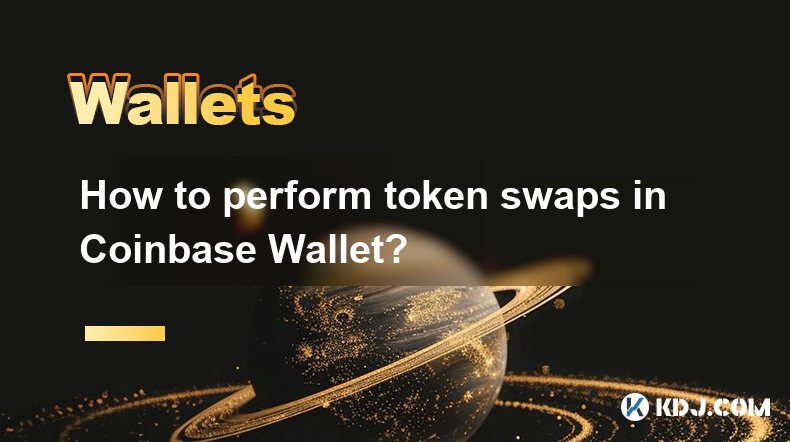
Key Points:
- Coinbase Wallet supports token swaps through various decentralized exchanges (DEXs) integrated within the app.
- The process involves selecting the tokens you want to swap, confirming the transaction details, and approving the transaction on your wallet.
- Gas fees, network congestion, and slippage are important factors to consider when performing token swaps.
- Understanding the risks involved, including potential scams and impermanent loss, is crucial before initiating any swap.
- Coinbase Wallet's user-friendly interface simplifies the swapping process, but prior knowledge of blockchain technology and DEXs is beneficial.
How to Perform Token Swaps in Coinbase Wallet?
Coinbase Wallet offers a convenient in-app experience for swapping various tokens. It leverages partnerships with different decentralized exchanges (DEXs), allowing users to trade directly from their wallet. The process is designed to be user-friendly, but a basic understanding of cryptocurrency and DEXs is recommended.
Before you begin, ensure you have the tokens you wish to swap already in your Coinbase Wallet. You'll also need sufficient network fees (gas) to cover the transaction costs. These fees vary depending on the network and its congestion. Check your wallet's balance and the current gas prices before proceeding.
To initiate a token swap, open your Coinbase Wallet app and navigate to the "Swap" or "Trade" section. This section's location might vary slightly depending on your app version. Look for a prominent icon or tab labeled similarly.
Once in the swap section, you'll be prompted to select the token you wish to swap from and the token you want to receive to. Enter the amount of the source token you intend to exchange. The wallet will automatically calculate the approximate amount of the target token you'll receive, taking into account the current market price and any fees.
After entering the desired amounts, review the transaction details carefully. Pay close attention to the exchange rate, the fees, and the total amount of the source token being used. Ensure you understand the potential for slippage, which is the difference between the expected exchange rate and the actual rate at the time the transaction is finalized. Network congestion can significantly impact slippage.
The next step is to approve the transaction. This usually involves confirming the transaction on your device, often by entering your wallet's password or confirming via biometric authentication (fingerprint or face ID). Once confirmed, the swap will be initiated, and the process may take some time depending on network conditions.
Understanding the DEXs and Network Fees
Coinbase Wallet integrates with various DEXs. These DEXs operate differently and may have varying fees and functionalities. While Coinbase Wallet simplifies the process, understanding the underlying DEX involved is crucial. Research the DEX used for your specific swap to better understand its fees and mechanisms.
Network fees, also known as gas fees, are crucial. These fees are paid to the miners or validators on the blockchain to process your transaction. High network congestion leads to higher gas fees. Monitoring gas prices and timing your swaps during periods of lower congestion can save you significant costs.
Risk Management and Security
Always double-check the address you're sending tokens to. Ensure it's the correct address for the receiving token and the intended recipient. Mistakes can result in irreversible loss of funds. Be wary of phishing attempts and only use the official Coinbase Wallet app. Never share your seed phrase or private keys with anyone.
Understand the concept of impermanent loss, especially if using decentralized exchanges. Impermanent loss refers to the potential loss incurred when the price of your swapped tokens changes after the swap. It’s important to understand these risks before making any significant trades. Thoroughly research the tokens involved before initiating any swaps.
Common Questions:
Q: What if my swap fails?
A: If a swap fails, the funds usually remain in your wallet. Check the transaction details for any error messages and contact Coinbase Wallet support if needed. The reasons for failure can include insufficient funds, high gas fees, or network issues.
Q: Can I swap any token?
A: Coinbase Wallet supports a wide range of tokens, but not all. Check the available token list within the app's swap function to see if your desired tokens are supported. The availability of tokens can also depend on the specific DEX used by the wallet.
Q: What are the fees involved in a token swap?
A: Fees comprise network fees (gas fees) paid to the blockchain and potential fees charged by the decentralized exchange used for the swap. These fees can vary significantly depending on network congestion and the DEX’s fee structure. Always review the transaction details before confirming.
Q: Is it safe to use Coinbase Wallet for token swaps?
A: Coinbase Wallet employs security measures, but cryptocurrency transactions inherently carry risks. Practice good security habits, such as using a strong password, enabling two-factor authentication, and being vigilant against phishing attempts. Remember that you are solely responsible for your private keys and the security of your wallet.
Q: How long does a token swap take?
A: The time required for a swap varies greatly depending on network congestion. During periods of high network activity, swaps can take longer. The process can range from a few seconds to several minutes or even longer. Monitor the transaction status within your wallet to track its progress.
Disclaimer:info@kdj.com
The information provided is not trading advice. kdj.com does not assume any responsibility for any investments made based on the information provided in this article. Cryptocurrencies are highly volatile and it is highly recommended that you invest with caution after thorough research!
If you believe that the content used on this website infringes your copyright, please contact us immediately (info@kdj.com) and we will delete it promptly.
- Bitcoin (BTC) price dips below ascending channel pattern as whales mirror a 2020 bull run signal
- 2025-04-01 07:50:12
- Mutuum Finance (MUTM) Has Been Relatively Quiet, But It's Building Fast
- 2025-04-01 07:50:12
- Cardano (ADA) Gains 4% This Week, Trading at $0.74 as Bullish Pressure Builds
- 2025-04-01 07:45:12
- Elon Musk Quashes Rumors of U.S. Government Using Dogecoin (DOGE) in Any Kind of Operations
- 2025-04-01 07:45:12
- Ethereum (ETH) and Solana (SOL) Prices Could Plunge as FTX Begins Creditor Repayments on May 30
- 2025-04-01 07:40:12
- Acting SEC Chair Rejects Enforcement, First US Bank-Issued Stablecoin, Bitcoin's Four-Year Cycle at Crossroads
- 2025-04-01 07:40:12
Related knowledge
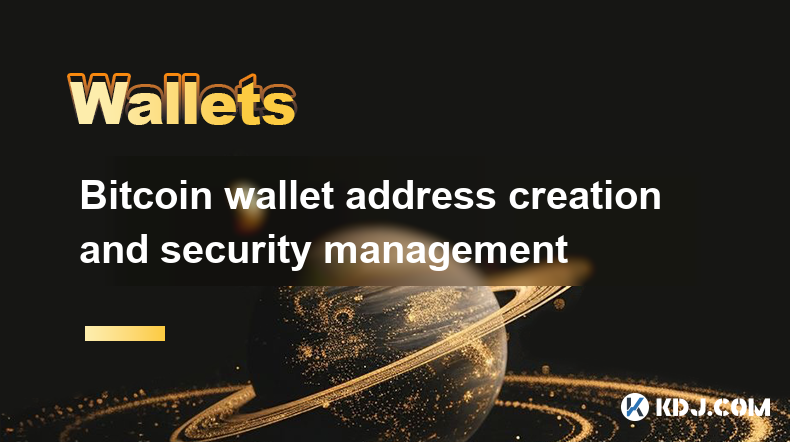
Bitcoin wallet address creation and security management
Mar 31,2025 at 10:56pm
Understanding Bitcoin Wallet AddressesA Bitcoin wallet doesn't store Bitcoin directly. Instead, it stores private keys which are long strings of characters. These keys grant access to your Bitcoin. Your public key, derived from the private key, is used to generate your Bitcoin wallet address, a unique identifier similar to a bank account number. This a...

How to easily generate a Bitcoin payment address
Mar 29,2025 at 10:49am
Generating a Bitcoin payment address might seem daunting, but it's actually quite straightforward. This process is crucial for receiving Bitcoin, as each transaction requires a unique address. Understanding how this works is fundamental to using Bitcoin effectively. This guide will walk you through the simple steps, regardless of your technical experti...
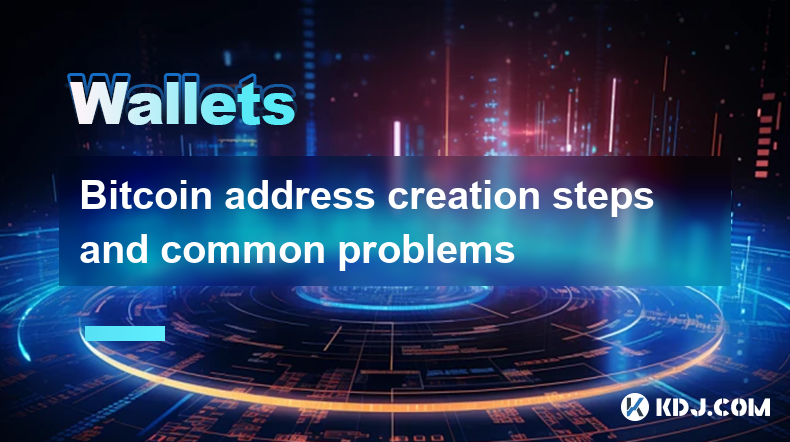
Bitcoin address creation steps and common problems
Mar 30,2025 at 06:07am
Understanding Bitcoin AddressesA Bitcoin address is a unique identifier, similar to a bank account number, used to receive Bitcoin. It's a string of alphanumeric characters generated from a public key, derived from your private key. Understanding the distinction between public and private keys is crucial for Bitcoin security. Your private key should be...
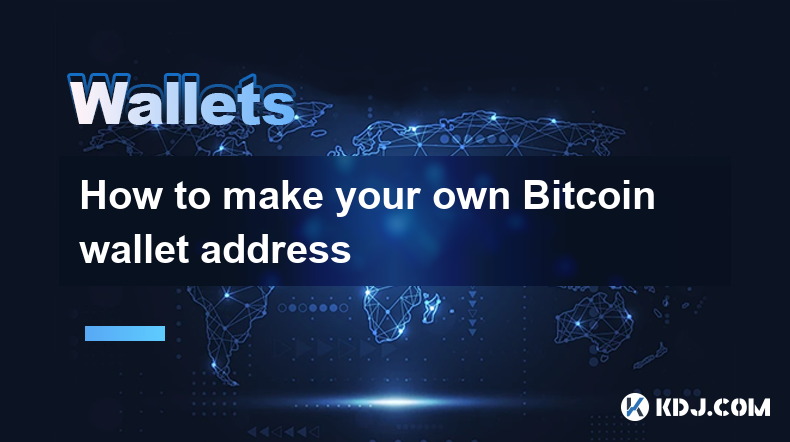
How to make your own Bitcoin wallet address
Mar 29,2025 at 08:42pm
Creating your own Bitcoin wallet address is crucial for securing and managing your Bitcoin holdings. It allows you to independently receive and send Bitcoin without relying on third-party services. This process involves understanding the different types of wallets and choosing the one that best suits your needs and technical expertise. Incorrectly gene...
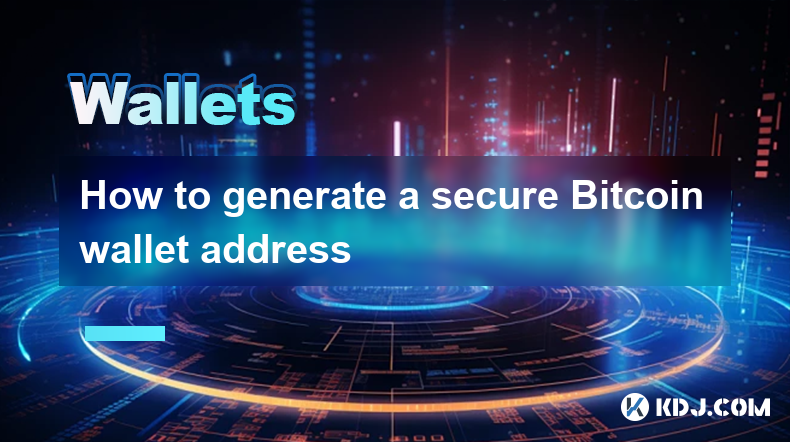
How to generate a secure Bitcoin wallet address
Apr 01,2025 at 03:14am
Understanding Bitcoin Wallet AddressesA Bitcoin wallet doesn't actually store your Bitcoin. Instead, it stores your private keys, which are long strings of characters that grant you access to your Bitcoin. Your public key, derived from your private key, is used to generate your Bitcoin address, a unique identifier similar to a bank account number. This...
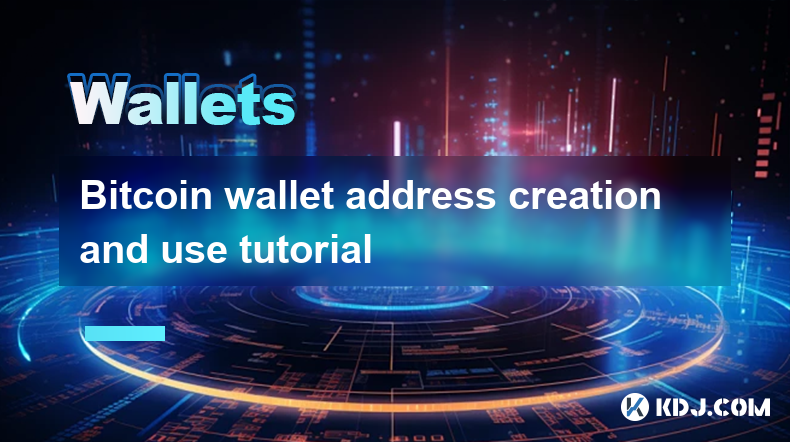
Bitcoin wallet address creation and use tutorial
Mar 29,2025 at 10:14pm
Understanding Bitcoin Wallet AddressesA Bitcoin wallet doesn't store Bitcoin in the way a traditional bank account does. Instead, it stores private keys, which are cryptographic secrets allowing you to access and spend your Bitcoin. Your Bitcoin address, on the other hand, is a public identifier, like an email address, that others can use to send you B...

Bitcoin wallet address creation and security management
Mar 31,2025 at 10:56pm
Understanding Bitcoin Wallet AddressesA Bitcoin wallet doesn't store Bitcoin directly. Instead, it stores private keys which are long strings of characters. These keys grant access to your Bitcoin. Your public key, derived from the private key, is used to generate your Bitcoin wallet address, a unique identifier similar to a bank account number. This a...

How to easily generate a Bitcoin payment address
Mar 29,2025 at 10:49am
Generating a Bitcoin payment address might seem daunting, but it's actually quite straightforward. This process is crucial for receiving Bitcoin, as each transaction requires a unique address. Understanding how this works is fundamental to using Bitcoin effectively. This guide will walk you through the simple steps, regardless of your technical experti...

Bitcoin address creation steps and common problems
Mar 30,2025 at 06:07am
Understanding Bitcoin AddressesA Bitcoin address is a unique identifier, similar to a bank account number, used to receive Bitcoin. It's a string of alphanumeric characters generated from a public key, derived from your private key. Understanding the distinction between public and private keys is crucial for Bitcoin security. Your private key should be...

How to make your own Bitcoin wallet address
Mar 29,2025 at 08:42pm
Creating your own Bitcoin wallet address is crucial for securing and managing your Bitcoin holdings. It allows you to independently receive and send Bitcoin without relying on third-party services. This process involves understanding the different types of wallets and choosing the one that best suits your needs and technical expertise. Incorrectly gene...

How to generate a secure Bitcoin wallet address
Apr 01,2025 at 03:14am
Understanding Bitcoin Wallet AddressesA Bitcoin wallet doesn't actually store your Bitcoin. Instead, it stores your private keys, which are long strings of characters that grant you access to your Bitcoin. Your public key, derived from your private key, is used to generate your Bitcoin address, a unique identifier similar to a bank account number. This...

Bitcoin wallet address creation and use tutorial
Mar 29,2025 at 10:14pm
Understanding Bitcoin Wallet AddressesA Bitcoin wallet doesn't store Bitcoin in the way a traditional bank account does. Instead, it stores private keys, which are cryptographic secrets allowing you to access and spend your Bitcoin. Your Bitcoin address, on the other hand, is a public identifier, like an email address, that others can use to send you B...
See all articles























































































